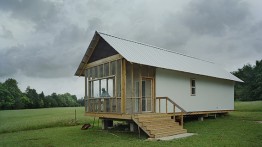Current Work | Andrew Freear and Rusty Smith, Rural Studio: The Challenges of Sustainable Rural Living
Wednesday, January 19, 2022, 7 - 9pm

Rural Studio | 20K Dave’s Home, Newbern, AL, 2009. Image credit: Timothy Hursley
This event will be conducted through Zoom. All participants must register in advance. Please register here to attend online via Zoom.
This fall and early winter, Current Work spotlights influential and innovative design practices that bring widely varying perspectives to contemporary housing challenges.
Andrew Freear and Rusty Smith direct Auburn University Rural Studio, a context-based service-learning program that questions the conventional education and role of architects. To date, Rural Studio has built more than 200 projects and educated more than 1,200 students in the Black Belt region of Alabama and Mississippi.
The organization’s current research focuses on innovative practices in-home access and affordability, efficient timber use, small-scale farming, and access to resources like clean water. Working with partners throughout the Southeast, Rural Studio is building homes to address rural America’s silent housing crisis.
Recent projects include:
Front Porch Initiative, a project aiming “to develop a scalable, agile, and resilient delivery process for beautiful, well-designed, high-performance homes […] in under-resourced rural communities,” according to the Studio’s project description.
20K Homes, an annual project in which Studio students design and build a low-cost home for a local resident.
Rural Studio Farm, a local food–sourcing experiment developed and maintained by the Studio’s students, including a passive solar greenhouse, a seed house, and a water collection system.
Andrew Freear is the J. Streeter Wiatt Professor and Director of Rural Studio. He was educated at the University of Westminster and the Architectural Association School of Architecture in London. He has designed and built exhibits for the Victoria & Albert Museum, the Whitney Biennial, the Museum of Modern Art, the Milan Triennale, and the Venice Biennale. His honors include the Ralph Erskine Award, the Global Award for Sustainable Architecture, and the Architecture Award from the American Academy of Arts and Letters. Freear was a 2018 Loeb Fellow at Harvard University and in 2020 received the President’s Medal from the Architectural League of New York.
Rusty Smith is the Associate Director of Rural Studio. He was educated at Auburn University and The School of the Art Institute of Chicago, and is a nationally recognized teacher and scholar. His teaching honors include both the American Institute of Architects National Teaching Honor Award and the American Institute of Architecture Students National Teaching Honor Award.
This program is supported, in part, by public funds from the New York City Department of Cultural Affairs in partnership with the City Council, and by the New York State Council on the Arts with the support of the Office of the Governor and the New York State Legislature.
The event is co-presented with The Architectural League of New York.
This lecture is free and accessible online only.




